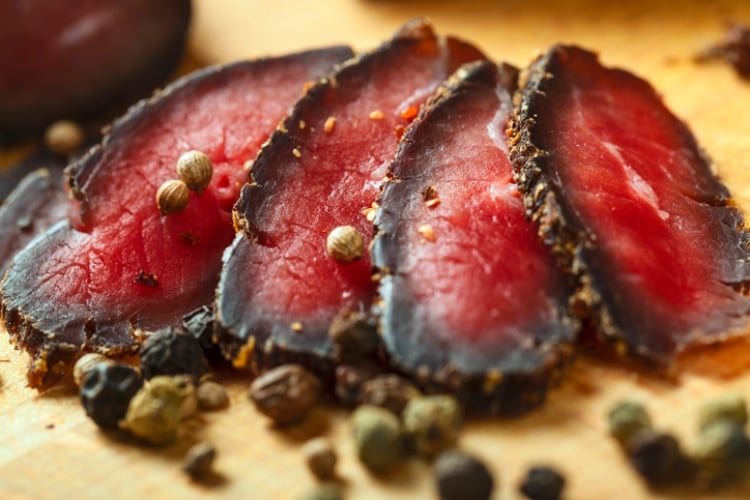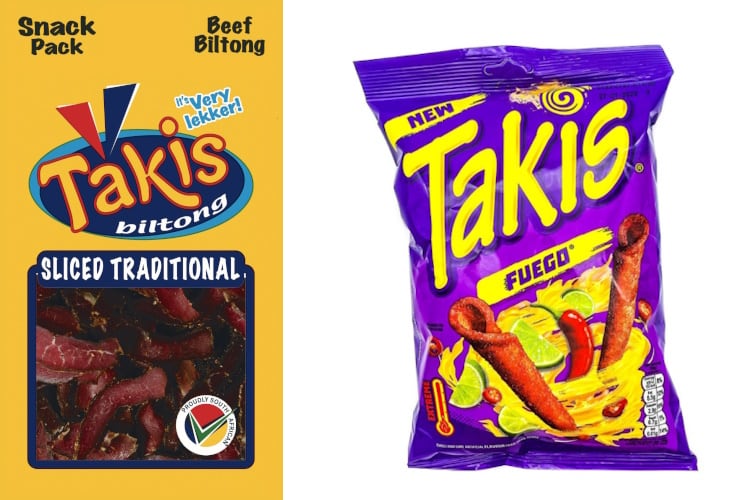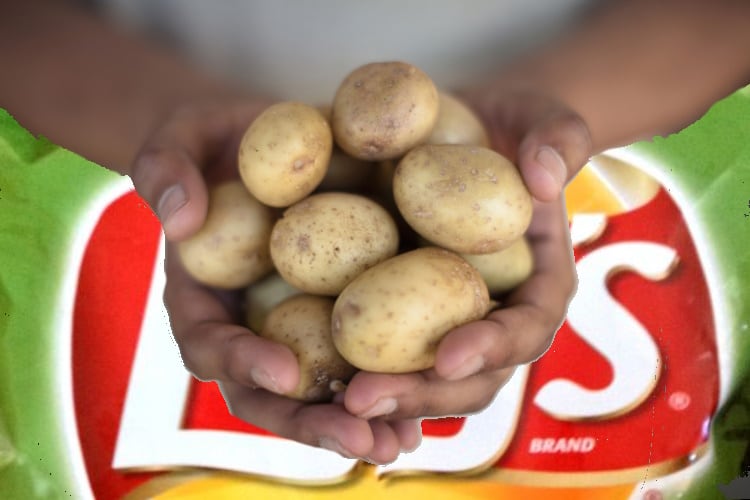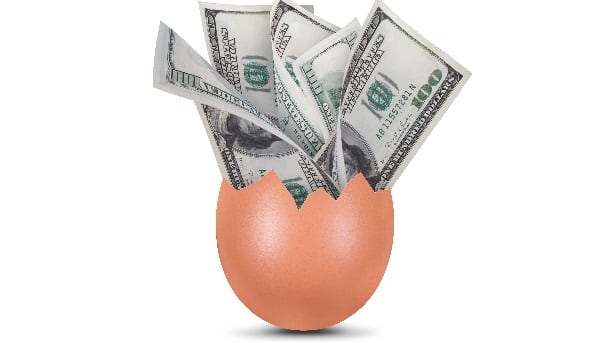The legal battle over the trademark ‘Takis Biltong’ and ‘Takis Fuego’ has been raging for eight years, but the tiny family business situated on the Vaal River in the south of Gauteng province in South Africa was not going to throw in the towel without a fight.
Let’s break it down.

Biltong is a cured and air-dried meat (beef, ostrich, game) spiced with coriander, black pepper, garlic, chili and more. Do not make the mistake of confusing it with jerky, which all South Africans consider a far inferior offshoot.
South African family producer Takis Biltong (Pty) Ltd has been producing biltong at its Vanderbijlpark-based factory for the past 50 years under the trademark Takis Biltong, which it registered in 2007 under class 29 (which covers meat).
Grupo Bimbo S.A.B., on the other hand, holds a 2012 South African trademark registration for the mark ‘Takis Fugo’ (stylised) in class 30 (which covers several goods, including bread, corn chips, wheat flour chips, extruded corn and wheat and popcorn).
In truth, Bimbo’s Takis are far removed from a meat snack, but Takis Biltong contended the fact they are similar in name and mark was causing confusion on the South African market.
Takis Fuego are actually rolled corn tortilla chips, which Barcel USA – the US snack division of Mexico-headquartered Grupo Bimbo – introduced into the North American market in 2006.
“This snack has had explosive popularity,” said Rubén Herrera, VP of Barcel USA, a few years after its launch.
“Although the product was launched in the US for the growing Hispanic market, Takis’ innovative shape and unique flavor have captivated teenagers of all ethnic backgrounds.”

In South Africa, though, Takis Biltong was not going to let what it considered an infringement to go uncontested and in a real David vs Goliath move, sought a court order to cancel (expunge) the trademark registration for Takis Fuego.
The application was brought under Section 24 of the South African Trade Marks Act, which deals with entries ‘wrongly made’ or ‘wrongly remaining’ on the register. The court ruled against it and this was turned down.
The attack on the registration for Takis Fuego was based on various sections of the South African Trade Marks Act:
- Section 24, which allows an interested party to apply for rectification of the register in respect of an entry ‘wrongly made in or wrongly remaining on the register’.
- Section 10(12), which talks of a mark that is ‘inherently deceptive or the use of which would be likely to deceive of cause confusion’.
- Section 10(14), which talks of a mark that is ‘identical to a registered trademark belonging to a different proprietor or so similar thereto that the use thereof … would be likely to deceive or would cause confusion’.
- Section 10(17), which deals with identity or similarity to a registered trademark which is ‘e’ in South Africa.
However, on appeal before three judges (the full bench of the High Court), Takis Biltong succeeded. The majority judgment found the marks in question were so similar that there was a likelihood of confusion or deception arising in the marketplace. Bimbo’s registration was cancelled.
Grupo Bimbo then turned to the Supreme Court of Appeal (SCA), asking to grant the special leave to appeal.
The SCA turned this down, leaving Takis Biltong with the exclusive use of the name for its products.
The reasons?
Judge Kathree-Setiloane said Takis Biltong had established the impugned mark was wrongly entered in the trademark register as it “was identical to or similar to its Takis logo marks.”
She described the “dominant, integral or essential element” of both marks was the word ‘Takis’ – an “invented word” – but with an inherent distinctiveness that puts it in “the category of a class of trademarks such as … Samsung, Toyota, Motorola and Nokia.”
On the other hand, “the word 'fuego' [which the judgment accepted as meaning 'fire' in Portuguese] … does not serve to distinguish the marks” and has “no trademark significance.”
Judge Kathree-Setiloane also said the undisputed photographic evidence annexed in the court papers confirmed that snack foods such as “biltong and related snack products are sold … side by side to other snack products including crisps/chips, ice creams, popcorn, peanuts and nuts in general.” She referred to the UK case of British Sugar v James Robertson and Sons (1996) – sometimes referred to as the Treats case – in which the court said that it is necessary to consider:
- The respective uses and users of the goods;
- The physical nature of the goods;
- The trade channels;
- The location of goods in supermarkets; and
- The issue of whether the goods are competitive.
SCA’s Judge Kathree-Setiloane also noted the only ground the applicant (Bimbo) had for the grant of Special Leave to Appeal was that there had been an equal split between the judge in the Court of first instance and the three judges in the Full Court. Bimbo claimed that factor alone demonstrated special circumstances, but the judge disagreed, adding that would mean that in every case where there was a dissenting judgment, a litigant would be entitled – without advancing more – to an order granting Special Leave to Appeal.
On 14 December 2023, she ultimately ruled the registration for ‘Takis Fuego’ had been wrongly entered on the register and thus cancelled it.
Grupo Bimbo has again applied for Special Leave to Appeal the judgment, which was dismissed with costs. It believes that in light of there also being a dissenting judgment, it had prospects of succeeding on appeal.
What are the lessons learned?
Reinard Krüger of Spoor & Fisher LLC digests the reasoning behind the decision.
An important element to this judgment is the Supreme Court of Appeal (SCA) provided practitioners with guidance as to how it will deal with matters to reconsider its decision to Special Leave to Appeal.
The SCA made it clear the special circumstances must serve something more than the existence of reasonable prospects of success on appeal. In this case, the appellant (Grupo Bimbo) merely advanced the ground there was an equal split – between the judge in the Court of first instance and the three judges in the Full Court – in their findings on the likelihood of deception or confusion arising between the two marks in question.
I believe a critical lesson to take away from this case is the importance of conducting an availability and registrability search before filing a trademark in South Africa.
I suspect that if Grupo Bimbo conducted an appropriate availability and registrability search, they would have noticed the prior ‘Takis’ logo registrations in the name of Takis Biltong and known the risks in continuing the use of Takis Fuego in South Africa.
This judgment also provides practitioners with further guidance as to how to interpret the ‘similar goods’ provisions of the Trade Marks Act, and in particular, the so-called British Sugar factors. In this regard, the decision gives practitioners guidance that goods in classes 29 and 30 can be perceived as similar.
Why was the SCA’s ruling different from that of the High Court?
The SCA judgment does not go into great detail as to why the Court of first instance ruled against Takis Biltong’s application, however, from my understanding it found the goods were not sufficiently similar to cause confusion or deception in the marketplace.
On appeal to the full bench of the High Court, the majority found that on comparison of the Takis Fuego vs Takis logo marks, they were so similar there was a likelihood of confusion or deception. The full bench also found there was sufficient undisputed evidence establishing the required reputation of Takis Biltong.
The SCA from the outset refused Leave to Appeal. As mentioned, Grupo Bimbo did not overcome the first hurdle by establishing the required special circumstances to grant Special Leave to Appeal, however, the SCA still decided to determine whether Grupo Bimbo had reasonable prospects. During this determination, the SCA found the full court came to the correct conclusion that the subject trademark should be cancelled.
What does this mean for small producers?
This ruling emphasizes the necessity of conducting thorough trademark searches and considering the broader marketplace context before selecting a trademark. It alerts the risks of legal challenges from established brands, stressing the need for a unique and distinguishable brand identity. This vigilance can mitigate costly legal disputes. Small producers should prioritize creating trademarks that clearly differentiate their products from those of existing players to avoid the pitfalls of trademark infringement/cancellation and ensure their brand's long-term viability in competitive markets.
Do you think Grupo Bimbo will challenge the SCA’s judgement?
The Supreme Court of Appeal is the highest court in South Africa for dealing with non-constitutional matters. I do not foresee a constitutional angle in this matter, and as such, I do not believe that Grupo Bimbo will approach the constitutional court in this matter.
Case:
Grupo Bimbo S.A.B. v Takis Biltong (293/2022) [2023] ZASCA 175 (14 December 2023)





